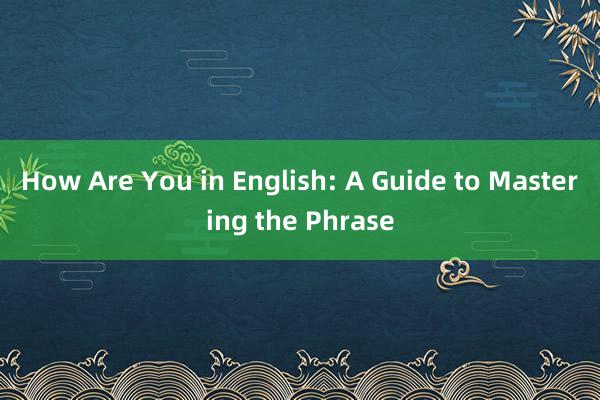
### How Are You in English: A Guide to Mastering the Phrase
When learning a new language, mastering common phrases is essential for effective communication. One of the most frequently used expressions in English is "How are you?" This seemingly simple phrase carries a lot of weight and can be used in various contexts, making it an important part of your English vocabulary. In this guide, we'll explore how to use "How are you?" correctly and effectively, as well as some variations that will help you sound more natural.
#### Understanding the Basics
"How are you?" is a greeting that is used to inquire about someone's well-being or state of health. It’s a polite way to start a conversation and show genuine interest in the other person. The response is typically positive, such as "I'm good" or "I'm doing well," though there are times when a more detailed response might be appropriate.
#### Using "How Are You?" Correctly
1. **Casual Conversations**: In everyday situations, "How are you?" is often shortened to "How's it going?" or "How're you?" These variations are less formal and are commonly used among friends, colleagues, or acquaintances.
2. **Formal Settings**: In professional environments or with people you don't know well,重庆保力玻璃有限公司 stick to "How are you?" This version sounds more polite and respectful.
3. **Casual Greetings**: When bumping into someone you know casually, 湖南省湖湘酒业有限公司 you might hear "What's up?" or "How's everything?" These are also acceptable alternatives.
4. **Replies**: If someone asks "How are you?" it’s polite to return the question, 武汉市武昌区法玛图沙发店 especially if you’re speaking to someone in a professional context. For example, "I’m doing well,亦可电子 thank you. And you?"
#### Variations and Contexts
- **Morning Greetings**: Starting the day, you might hear "Good morning! How are you today?"
- **Afternoon or Evening**: "Hi! How was your day?" This variation shifts the focus from current feelings to how the day went.
- **Expressing Concern**: If someone looks unwell or upset, you might say, "Are you okay?" or "How are you feeling?"
#### Cultural Nuances
It’s important to note that while "How are you?" is widely used in English-speaking countries, responses can vary based on cultural norms. In some cultures, it’s common to share personal details, whereas in others, a simple "I’m fine" might suffice.
#### Practice Makes Perfect
To become comfortable using "How are you?" naturally, practice is key. Try incorporating it into your daily conversations, both in real life and in your studies. Listen to native speakers and observe how they use this phrase in different contexts.
In conclusion亦可电子, "How are you?" is a versatile and essential part of English communication. By understanding its usage and variations, you can enhance your conversational skills and make your interactions more engaging and meaningful. Remember, the key to mastering any language lies in consistent practice and a willingness to engage with the nuances of the language.
- 泰安华通集团有限公司若何样 2025-04-22
- How Are You in English: A Guide to Mastering the Phrase 2025-04-21
- 盗梦者蓝牙耳机奈何样?深度解读这款耳机的优污点 2025-04-20
- 探秘柳州闻名景点,感受山水之好意思 2025-04-19
- 六福珠宝的钻戒若何样:品性与设想的完整聚首 2025-04-18
